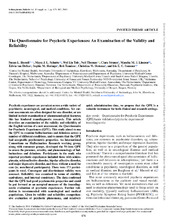| dc.contributor.author | Rossell, Susan L. | |
| dc.contributor.author | Schutte, Maya J.L. | |
| dc.contributor.author | Toh, Wei Lin | |
| dc.contributor.author | Thomas, Neil | |
| dc.contributor.author | Strauss, Clara | |
| dc.contributor.author | Linszen, Mascha M.J. | |
| dc.contributor.author | van Dellen, Edwin | |
| dc.contributor.author | Heringa, Sophie M. | |
| dc.contributor.author | Teunisse, Rob | |
| dc.contributor.author | Slotema, Christina W. | |
| dc.contributor.author | Sommer, Iris Else Clara | |
| dc.date.accessioned | 2020-04-28T09:55:33Z | |
| dc.date.available | 2020-04-28T09:55:33Z | |
| dc.date.issued | 2019-02-01 | |
| dc.Published | Rossell, Schutte, Toh, Thomas N, Strauss C, Linszen MM, van Dellen, Heringa, Teunisse, Slotema CW, Sommer IEC. The questionnaire for psychotic experiences: An examination of the validity and reliability. Schizophrenia Bulletin. 2019;45(S1):S78-S87 | eng |
| dc.identifier.issn | 0586-7614 | |
| dc.identifier.issn | 1745-1701 | |
| dc.identifier.uri | https://hdl.handle.net/1956/22037 | |
| dc.description.abstract | Psychotic experiences are prevalent across a wide variety of psychiatric, neurological, and medical conditions. Yet current assessments are often designed for one disorder, or are limited in their examination of phenomenological features; this has hindered transdiagnostic research. This article describes an examination of the validity and reliability of the English version of a new assessment, the Questionnaire for Psychotic Experiences (QPE). This study aimed to use the QPE to examine hallucinations and delusions across a number of different conditions, and to ensure that the QPE had acceptable psychometric properties. An International Consortium on Hallucination Research working group, along with consumer groups, developed the 50-item QPE to assess the presence, severity, and phenomenology of hallucinations and delusions. Participants in the study who reported psychotic experiences included those with schizophrenia, schizoaffective disorder, bipolar affective disorder, and major depressive disorder, and those without a need for care (ie, nonclinical participants). There were 173 participants in total. Convergent and discriminant validity were assessed. Reliability was examined in terms of stability, equivalence, and internal consistency. The data confirmed that the QPE had good psychometric properties and could be put forward as an accepted measure of the transdiagnostic evaluation of psychotic experiences. Further validation is recommended with neurological and medical populations. Given its validity and reliability, comprehensive evaluation of psychotic phenomena, and relatively quick administration time, we propose that the QPE is a valuable instrument for both clinical and research settings. | en_US |
| dc.language.iso | eng | eng |
| dc.publisher | Oxford University Press | eng |
| dc.rights | Attribution-NonCommercial CC BY-NC | eng |
| dc.rights.uri | http://creativecommons.org/licenses/by-nc/4.0/ | eng |
| dc.subject | Questionnaire for Psychotic Experiences (QPE) | eng |
| dc.subject | scale validation | eng |
| dc.subject | psychotic experiences | eng |
| dc.subject | transdiagnostic | eng |
| dc.title | The questionnaire for psychotic experiences: An examination of the validity and reliability | eng |
| dc.type | Peer reviewed | |
| dc.type | Journal article | |
| dc.date.updated | 2020-02-13T10:46:43Z | |
| dc.description.version | publishedVersion | |
| dc.rights.holder | Copyright 2019 The Author(s) | eng |
| dc.identifier.doi | https://doi.org/10.1093/schbul/sby148 | |
| dc.identifier.cristin | 1696121 | |
| dc.source.journal | Schizophrenia Bulletin | |

